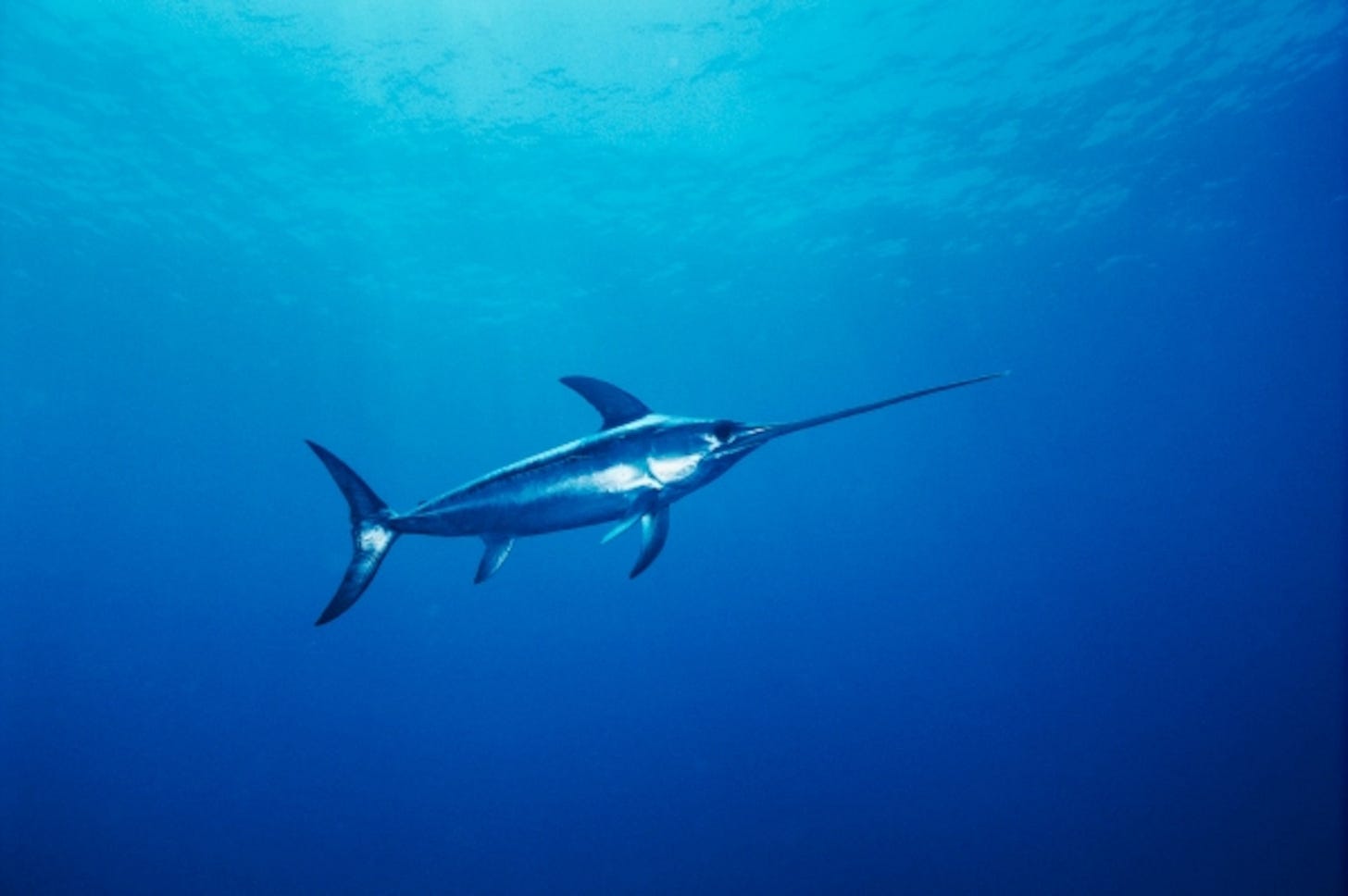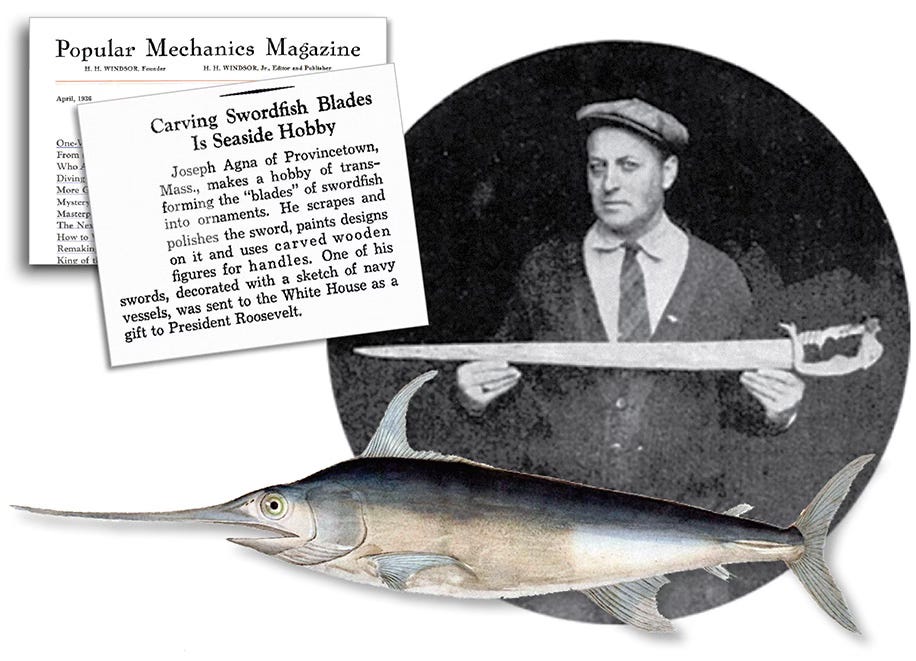Back in the early 2000s, a magazine sent me to Chile, to profile a treasure hunter living on Robinson Crusoe Island. The treasure guy was from Chicago and had made a fortune selling office furniture, and through a show on the Discovery channel, became obsessed with the possibility of buried pirate booty, and moved to this island to dig for it. (The finished article ended up a mangled mess, and for the first time in my life, I asked the editors to take my name off the byline.) But during my visit, a crazy scenario unfolded in which some fishermen gave me a severed fish beak, and I endeavored to smuggle it back into the United States. This story originally appeared in an issue of The Fray, and was also recorded for KALW’s program “Invisible Ink.”
A few years ago, I traveled to Robinson Crusoe Island, a tiny land mass 300 miles off the coast of Chile, to write about an American treasure hunter. For eight years, he has been digging for buried treasure, supposedly stashed there by a rogue Spanish conquistador. I had no problem finding the American—there’s only 600 people on the island—and spent most of the week observing his crew digging holes in a hillside. As with the previous seven years, no treasure yet.
My last day on the island, I’m hanging around the harbor, and start talking to two local fishermen. They disappear back inside their boat for a moment, and hand me the freshly severed beak of a swordfish. It’s an amazing thing, three feet long and splattered in blood. The fish utilizes its beak to stun its prey, but it also tears up the fishing nets. Which is why this specimen has been de-nosed. It’s sharp and hard. I bang it on the dock. Yep, that’s one hard beak.
I start to hand it back and the fishermen gesture, no no, it’s yours. Please keep it. You have to say yes, right? It’s impolite to refuse such a gift. And with America’s reputation overseas, I don’t need any more reason to apologize.
The rest of the day, I carry the nose around with me, and end up in a pirate-themed bar with some friends who run a scuba tour company. In the background, a group of sailors are celebrating their recent voyage from the mainland, chugging Pisco sours and pounding their fists on the bar, shouting in unison, “Juan Fernandez! Juan Fernandez!” (the traditional Chilean name of the island).
Over the noise, I ask my friends what am I going to do with a 3-foot fish beak? They excitedly say I can polish it up to a shine, attach a handle to the base, and it makes a very nice sword. When you get home, they tell me, start by hanging it upside down until it dries out. This takes about a year.
At the end of the night, I take the future sword back up the hillside to my hosteria, and sleep with it next to my bed. The next morning, before my flight I have the houseboy help me wrap up the snout in plastic. It’s too big for my suitcase, so I stick it in my backpack. I hop on the daily flight back to the mainland, along with a handful of locals and boxes of live lobsters.
At the Santiago airport, I check in my bag and the airline guys behind the counter ask what’s sticking out of my bag. I tell them and they chuckle, “You’re never going to get that through customs.” I smile and think to myself, this is a challenge I accept.
Before boarding, I visit the gift shop and buy a pack of Cuban cigars. In America they’re illegal, but since the rest of the world doesn’t have a dysfunctional relationship with Cuba, it’s very easy to find such contraband.
I carry my backpack on the flight to Atlanta. It’s starting to stink a bit, but otherwise no problem. After I land, the trouble starts.
At customs in Atlanta, three Homeland Security dudes immediately spot me, massive muscled guys dressed in black, their belts bulging with gear. They escort me aside to a separate area, invoking more than a few curious looks. One gets on his radio, and the others start asking me questions in a quiet tone. Because I’m pretty sure most travelers don’t bring beaks of swordfish into Hartsfield-Jackson Atlanta International Airport.
I present them the beak, making sure not to spill the cigars in the front pocket of my shirt (if you get caught smuggling them, your name goes on a list to customs around the world.). This is my big Midnight Express moment. My boarding pass is covering the cigars, but one quick search and I’m busted cold.
The muscled guards inspect the snout, which now looks more menacing than before. I realize for the first time this could easily be used as a weapon. Again I tell the story of the charming old-world fishermen who gave it to me as a gesture of friendship. Another issue emerges—it could be an endangered species. So one guard goes to make a phone call to the Department of Fish and Wildlife. After an uncomfortable amount of time he returns and says it’s okay. The others frown, clearly disappointed they won’t be able to throw me down and cuff me. I stick it back in my pack, and get back in line for the X-ray machine.
Again, I’m stopped. It’s difficult to deny your bag is carrying something long and sharp. Two hefty security women take me aside and ask more questions and talk on their radios. For the third time, I recount my tale of international friendship and the giving of gifts.
They bring out some scissors, delaying everyone in line, and cut the plastic to examine the beak. A big whiff of stinky rotting fish escapes, repulsing the travelers waiting behind me. One of the security ladies wrinkles her nose and turns her head and walks away like she’s going to throw up. The other waves off her reaction, saying to me, “Aw, thass alright, she just pregnant.”
They examine the beak and take interest in the dried blood. I quickly explain that the other security staff already called it in, and it’s not an endangered species. One pokes the flesh with a gloved finger, then shrugs. The Homeland Security signal for, I have more important things to do than bust a guy with a fish beak. I make them wrap it back up, because at this point I can demand a little respect. They get some tape, and carefully rewrap the proboscis, and I once more stuff it back into my pack.
I find my seat on the plane and toss the pack in the overhead. And now because the beak has been unwrapped twice, it’s really starting to smell. A powerfully rank odor, like an alleyway behind a restaurant, which fills the cabin and hangs in the air the rest of the flight back to San Francisco. I arrive back home, unwrap it and set it out on my deck because the stench is just too much for the house.
Fashioning it into a sword seems a little corny, but I don’t know exactly what to do with this thing. So I let it dry out naturally, and maybe someday I’ll figure out an alternative use.
Not long ago, my neighbor’s dog discovered the beak, and realizing she’d stumbled upon the world’s biggest chew toy, systematically destroyed it within a day.





What a bonkers story! Feels like a metaphor — all that we want and suffer over keeping in the end is a chew toy.
What about the Cuban cigars? Did they go unobserved at the end too?